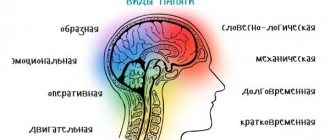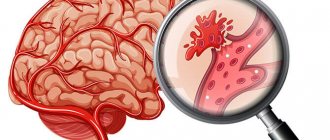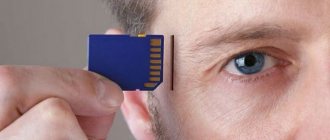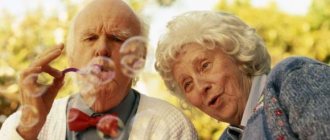In colloquial language, memory loss in older people is most often called senile sclerosis, although in fact there is no such disease. In medicine, scientific terminology leans more towards senile dementia and dementia, one of the manifestations of which is amnesia. After the age of 60, more than 20% of people begin to experience problems with remembering and reproducing the necessary information. This leads to social maladjustment, self-doubt and worsens the quality of life and communication with loved ones.
Causes
Many people, not unreasonably, believe that senile memory loss is dictated mainly by age-related changes occurring in the human body. However, they include a wide range of physiological and mental abnormalities, and in each individual case, a specific one of them becomes the trigger. It definitely needs to be determined, because in the future the main line of therapy will be the treatment of this particular disease.
Physiological
- Hemorrhagic or ischemic cerebral circulatory disorders;
- hypertension, vascular aneurysms, angiomas, cerebral hypoxia;
- hypertension;
- oncology;
- cardiovascular diseases: atrial fibrillation, pre-infarction, stroke, heart defects, ischemia, hypercholesterolemia, thrombophlebitis, heart failure;
- TBI;
- severe chronic diseases: varicose veins, senile dementia of the Alzheimer's type, insulin-dependent diabetes;
- intoxication of the body;
- taking a large number of medications (to treat one of the main diseases);
- toxic encephalopathy.
In older people, age leaves its mark on the functioning of almost any organ, and the brain, the parts of which are responsible for memory, is no exception. Its loss may not even be due to any specific disease, but to ordinary, natural aging of the body:
Aging → Deterioration of brain activity → Cell degeneration → Disorders of biochemical processes (including blood circulation) → Loss of neural connections between individual areas of the brain → Memory lapses
Psychological
- Psychotraumatic situation;
- stress;
- conflicts in the family;
- depression;
- increased mental and emotional stress;
- chronic fatigue (not only physically, but also mentally);
- mental and nervous disorders.
Sometimes memory loss in old age is a consequence of external circumstances or the lifestyle that a person led before. For example, according to statistics, more than 40% of older people with dementia are alone, they have neither spouses nor children who could care for them. Psychologists and psychotherapists call this one of the reasons for amnesia. In addition, if a person for many years, as long as his health allowed, smoked, abused alcohol, and did not think about proper nutrition and sports, his risk of developing senile amnesia increases several times.
Folk remedies
The main advantage of treating memory loss is that it can be supplemented with folk remedies. They are effective and completely safe. It is enough to take them regularly, making them part of your daily diet.
Popular folk remedies:
- Walnut. Pour the prepared walnut leaves (50 g) with hot water (1 l), cover with a cloth and leave for several hours. After brewing, the drink should be drunk three times a day, one glass.
- Eleutherococcus roots. Take some roots (40 g), add clean water (600 ml), put on the stove and boil for 10 minutes. After straining, drink one glass of the product every five hours.
- Thyme. Pour thyme (1 tbsp) into a jar, carefully pour boiling water (1 l), close the lid and leave for 15 minutes. Instead of other hot drinks, take one glass three times a day.
- Red rowan. Pour boiling water (250 ml) over the rowan bark (1 tbsp), put on the stove and boil for 10 minutes. Leave the broth for 5 hours, then strain through cheesecloth and drink 20 ml three times a day.
- Sage with mint. Grind the plants (2 tbsp), add hot water (500 ml) and leave for 12 hours inside a closed container. Take 50 ml 30 minutes before meals three times a day.
In case of partial memory loss in older people due to a head injury, chopped walnuts with honey, as well as freshly squeezed juice or a decoction of potato fruits, will be very effective.
Symptoms
All older people experience memory loss differently.
In communication:
- they forget about agreements, doctor’s appointments, meetings;
- call loved ones by other names (considering them to be someone from their childhood or youth);
- irritable, even aggressive, most of the time they are in a bad mood;
- capricious, demanding;
- touchy, vulnerable;
- They never admit memory lapses and are offended when this is pointed out to them.
At home:
- inattentive: they can spill water, drop a vase;
- they forget to turn off the iron, lock the door, close the window;
- they stop taking care of themselves, they may forget to get dressed in the morning or brush their teeth;
- do not maintain order in the house;
- distracted, do not perform basic daily tasks.
In terms of abilities:
- speech is impaired: slurred speech, substitution of words, failure to pronounce endings, lack of logical connection;
- concentration decreases;
- rapid fatigue;
- slowness, inability to perform basic actions.
On the health side:
- headache;
- nausea;
- confusion;
- difficulty breathing;
- tachycardia;
- paralysis of limbs, weakening of motor functions;
- anisocoria.
It may seem that such symptoms are always accompanied by old age. However, it is precisely these alarm bells that indicate that an elderly person is developing amnesia, and this process must be stopped in time. Both attention and the performance of basic skills - all this is directly related to the changes that occur in the brain, and therefore with memory too.
Kinds
It is impossible to identify a general pattern, so memory loss in those over 60 is usually classified into several types. Moreover, the reasons for such a division are different.
Volume
- Partial
It represents a fragmentary loss of certain events limited in time. Often older people recall their own childhood in detail (down to how many kittens and what color the cat Musya gave birth to before Christmas, when he (she) was 5 years old). However, they cannot reproduce the events of yesterday. Sometimes more distant moments also appear: for example, old people often deny that they buried their husband (wife) or other loved one several years ago.
- Full
One of the most terrible forms is when older people lose the entire amount of information about their lives, starting with where they live and ending with their own name. They do not recognize their relatives, they are disoriented in space, time and communication.
Events
- Retrograde
Involves loss of memory of a specific event. Often associated with some kind of traumatic factor or illness. An older person may not remember the death of a loved one, surgery, or hospital treatment. Moreover, information about what happened before is retained.
Read more…
- Anterograde
It also happens that a person perfectly remembers an important event (his own illness, moving, traveling) down to the smallest details (unlike retrograde). But he forgets everything that happened after that.
Read more…
Basic knowledge and skills
- Semantic
Common senile dementia, when memories of the surrounding reality are lost. The easiest form is when the names of household items are forgotten. If you ask him to bring a plate, he may not comply with the request because he will not understand what it is about. Moderate severity of semantic memory loss - he does not remember what certain things are for. For example, the same plate can be used as a headdress or a chamber pot. The most severe case is when both previous forms are combined and complicated by the loss of memories of almost all objects surrounding the old man: starting with a toothbrush and ending with pets.
- Procedural
Partially resembles the moderate severity form of semantic memory loss. This is the loss of basic everyday skills. An elderly person does not remember how to brush his teeth, in which hand to hold a spoon, or how to put on a shirt. In this case, constant care and monitoring of actions is required.
- Professional
Despite the fact that many retire in old age, people continue to work at 60. They may be overtaken by professional memory loss, when the sequence of actions that a person must perform in the workplace is forgotten. He doesn’t remember which folders on the computer he needs to open, who to call, what to say at a meeting, how to make a report, etc.
Memory type
- Short term
In 90% of cases in old age, short-term memory loss is diagnosed. There is a loss of memories of events that just happened or very recently. A person may forget that he ate a few minutes ago and eats again. If you tell him that you visited yesterday, he will not believe you and will claim that he spent the entire day yesterday completely alone. These attacks usually recur regularly (for example, every week or month), but are quite rare at first. Moreover, in most cases, he himself is aware of the problem, has complexes about it and can ask his family to help him.
Causes of loss of short-term memory: head injury, stroke, psychotrauma, depression, smoking for many years, alcoholism (intoxication of the body), taking powerful medications (to relieve the underlying disease, which is usually detected closer to old age).
Experts call vitamin deficiency a separate reason. It leads not only to memory loss, but also to numerous associated symptoms: nervousness, insomnia, thyroid dysfunction.
In 50% of cases with loss of short memory in old age, drug therapy is not required - it is enough to adjust your lifestyle. It is temporary, so it does not cause much concern.
- Long-term memory
As is correct, there are no problems with long-term memory in old age. On the contrary: it seems to be intensifying. Often, old people remember their own childhood down to the smallest detail and can calculate utility bills the first time without a single mistake. Scientists have not yet found an explanation for this phenomenon.
Suddenness
- Gradual
Due to age-related changes in the structure of the brain, as well as against the background of various chronic diseases, gradual amnesia occurs in the elderly. They lose memories in fragments. Moreover, violations of short-term memory begin: first they forget to go to the store or to see a doctor, then they get confused in the story of what happened a month ago, and over time, earlier events are erased. The pathology is mild in nature, can develop over years (in this case they speak of a progressive form), and with proper care and help from a specialist, it can stop altogether.
The most common causes: diabetes mellitus, hypertension, Alzheimer's disease, hypercholesterolemia, cardiovascular pathologies, varicose veins.
- Sudden
One of the most dangerous memory loss for older people is sudden, unexpected, occurring in an instant. One minute everything was fine, and now the person doesn’t remember who he is or where he’s going. Most often it is complete, that is, even one’s own name is forgotten. It’s good if the elderly are at home at this moment. However, this is increasingly happening on the street. They don't remember who they are or where they live. They are taken to hospitals and police stations, but it is not always possible to return them to their loved ones.
In 50% of cases, sudden memory loss in the elderly is explained by the following circumstances: head injury (fall or hit on the head), psychological trauma (a car accident occurred before his eyes), cerebral hemorrhage or capillary rupture. But in 50% of cases, doctors are unable to explain why the hippocampus (a part of the brain) so sharply refuses to record and reproduce information.
Memory losses
Encephalitis
Diabetes
27142 August 21
IMPORTANT!
The information in this section cannot be used for self-diagnosis and self-treatment.
In case of pain or other exacerbation of the disease, diagnostic tests should be prescribed only by the attending physician. To make a diagnosis and properly prescribe treatment, you should contact your doctor. “Memory lapses” mean complete or partial loss of memories.
However, such an interpretation may imply memory loss, or may indicate an inability to remember this or that fact at a given moment.
Varieties
Memory is ensured by the functional activity of all parts of the brain and includes various processes - memorization, storage (or, conversely, forgetting), recognition and reproduction. Disruption of any of these processes will lead to memory defects.
It is the fight against forgetting (an important process that protects the brain from excess information) that ensures the retention of important data.
Two more processes – recognition and reproduction – make it possible to “bring to the surface” the required information.
Thus, memory loss, or lapses, refers to the inability to recognize or reproduce data stored in the brain. Memory lapses (or amnesia) may occur over time. Retrograde
amnesia is characterized by the inability to remember events preceding an injury or illness;
anterograde amnesia
is accompanied by loss of memory for events that occurred after the illness.
There are also retroanterograde
amnesia (a combination of the first two) and
fixation
, characterized by the inability to remember current events.
If memory for events at the time of injury or illness is lost, they speak of congrade
amnesia.
Possible reasons
Memory lapses do not always indicate any disease.
Rapidly changing information is absorbed only by short-term memory and is stored for several days. An example of such memorization is preparation for an exam: a large amount of data is absorbed in a short time and just as quickly disappears from memory.
Storing information for long periods of time requires processing and encoding.
Only after this the necessary data is recorded in the brain structures.
In the presence of psychological factors
(stress, nervous overstrain) or constant fatigue and lack of sleep, concentration is disrupted, which impairs the memorization process.
Memory lapses often occur as a defensive reaction to emotional stress.
A typical example of this condition is sudden memory loss during exams or when speaking in front of an audience. These failures refer to transient memory impairments, but in some cases they may indicate a circulatory disorder in the area of the posterior cerebral arteries, which most often occurs with alcoholism and drug addiction
.
Damage to even small areas of the brain due to traumatic brain injury
also leads to memory loss or blackouts.
In this case, retrograde amnesia occurs, which lasts several hours before the injury. Longer fixation amnesia is also possible - several days immediately after the injury, which is noted when the patient is clearly conscious. A few days after the injury, memory is restored in most cases. Surgeries on the temporal lobes of the brain
lead to transient memory impairment .
Patients with epilepsy
forget not only the seizure itself, but also the short period of confusion after it.
In some cases, it is precisely such memory lapses that give reason to suspect epilepsy during non-convulsive seizures.
Memory disorders may be caused by metabolic disorders in the central nervous system.
Deterioration of brain function occurs with a lack of oxygen due to cardiopulmonary failure
, toxic damage due to
liver and kidney failure
.
Oxygen starvation of the brain after a sharp rise or fall in blood pressure is often accompanied by a sharp deterioration in memory.
The same effect has a decrease in glucose levels during fasting and
diabetes
. In addition, with diabetes mellitus, angiopathy develops - damage to blood vessels, which aggravates nutritional deficiency.
A sharp deterioration in memory with failures occurs with hypothyroidism
, which is caused by a lack of iodine in the body.
Deficiency of vitamin B12 and folic acid
is also accompanied by memory impairment.
Vitamin B12 is necessary for the regeneration of myelin, a substance that covers nerve fibers and ensures their functioning.
Destruction of the myelin layer is accompanied by slowing of nerve impulses and memory impairment. Memory may be affected in patients taking certain medications
. These include anticholinergics (atropine, scopolamine, platiphylline, metallisir), antidepressants and antipsychotics. Steroid hormones have a destructive effect on brain structures and, accordingly, memory. Recent studies show that people who take steroid hormones for a long time (for example, bodybuilders) have serious problems with visuospatial memory. Information about the negative effect of steroid hormones on memory should also be taken into account in patients with bronchial asthma and arthritis.
Tumors
, infectious diseases that lead to damage to the central nervous system sometimes have an irreversible effect on memory.
Such diseases include encephalitis
and
meningitis
.
Inflammation of the membranes and tissue of the brain leads to the destruction of nerve structures and, as a result, to impairment of cognitive activity, speech and memory.
There are memory impairments associated with age.
Normally, the first signs of memory decline appear after 50 years of age, which is associated with a weakening of concentration and a decrease in the processes of encoding information. However, if memory loss progresses sharply, more serious illnesses may be suspected. First of all, memory loss can occur with senile, or senile, dementia. With dementia, diffuse damage occurs to the cerebral cortex (for example, in Alzheimer's disease
) or subcortical structures of the brain (
Parkinson's disease, Huntington's chorea, multiple sclerosis, encephalopathy
).
The earliest sign of Alzheimer's disease is loss of memory for recent events.
This symptom may later be accompanied by speech and cognitive impairments. As the disease progresses, loss of fixation, anterograde and retrograde memory develops. Memory for events that happened a long time ago is retained for the longest time. With Parkinson's disease and multiple sclerosis, a person spends a lot of time remembering past events or facts. At the same time, he gets tired quickly, it is difficult for him to remember new information or master motor skills.
With repeated repetition of new material and the establishment of semantic analogies, the memorization process becomes easier, but requires constant reinforcement.
Diagnostics and examination To diagnose the causes of memory impairment, an assessment of the patient’s mental state, a thorough analysis of the data revealed during the survey, and the dynamics of the development of the disease are necessary. Significant information can be obtained using various laboratory tests and instrumental examinations, as well as assessing the patient’s neurological status. Brain CT and MRI data are used as an objective criterion.
Diagnostics
In most cases, memory loss in old age is quite pronounced and does not require any laboratory or instrumental evidence. However, after visiting a doctor, a full medical examination is carried out with an emphasis on brain examinations. This is due to the fact that it is not amnesia itself that is primarily subject to diagnosis (it clearly manifests itself), but the diseases against which it develops. Elementary tests are prescribed for a general assessment of the patient’s condition.
Primary examination:
- appointment with a therapist;
- consultations with the necessary specialists (primarily a cardiologist, phlebologist, ophthalmologist and neurologist);
- Ultrasound of internal organs;
- ECG and EchoCG;
- general blood and urine tests.
After identified disorders after 60 years, a separate diagnostic program is usually carried out:
- Dynamic ECG: at rest and during exercise;
- more detailed echocardiography;
- Doppler ultrasound;
- MRI of the head;
- REG (rheoencephalography);
- MR angiography;
- electroencephalogram;
- ENMG examination;
- ultrasonography;
- X-ray of the head;
- CT;
- two-photon emission tomography;
- complete biochemical blood test.
All these diagnostic studies allow us to identify damaged areas of the brain and the true cause of memory loss. Depending on this, appropriate treatment is prescribed.
Short-term memory loss
One of the reasons for memory deterioration is the deterioration of the central nervous system (CNS). The process of renewal and formation of nerve cells is affected by slow metabolism, which often leads to short-term memory loss. In addition, sudden memory loss can be caused by other physiological and psychological reasons.
Physiological reasons:
- excessive mental stress;
- chronic malaise associated with the presence of various diseases;
- bruises, blows to the head;
- psychoneurological pathologies;
- cerebrovascular accident;
- Alzheimer's and Parkinson's disease;
- prolonged intoxication of the body;
- lack of physical activity;
- slow metabolism;
- lack of adequate regular nutrition;
- infectious diseases in active form.
Psychological reasons:
- depression;
- prolonged nervous tension;
- lack of proper rest, resulting in overexcitement;
- prolonged loneliness, lack of communication with loved ones.
Often the cause of memory impairment in old age is due to previous diseases (stroke, ischemia and their complications) and alcohol addiction.
Lack of medical attention for short-term memory loss can lead to brain dysfunction, so such patients need to be examined by a specialist.
Treatment
For some reason, many people think that since senile sclerosis is a completely natural phenomenon, it is not necessary to treat it. Why, they say, if over time memory loss progresses and only becomes more obvious? This is a dangerous misconception. Despite the fact that age-related changes in the body are natural and cannot be stopped, it is still possible to slow them down. With adequate treatment and compliance with all medical recommendations, the patient’s condition improves significantly and the development of amnesia is not observed in the future.
Medication
First of all, elderly people with memory loss are prescribed therapy for the underlying diseases that caused the amnesia. Most often prescribed are ganlioblockers for hypertension, decongestants and sedatives.
At the same time, it is recommended to take medications that improve cerebral circulation. Such drugs are called neuroprotectors (cerebroprotectors). They adapt brain cells to age-related changes, saturate them with oxygen, and they gradually, if not restored, then begin to function more fully than before treatment.
More often than others, the elderly are prescribed the following pills for memory loss.
Nootropics
They activate metabolic processes in nervous tissues, help with mental disorders, slow down aging, prolong life, and accelerate memory. These are Piracetam, Cerebrolysin, Semax, Ceraxon, Picamilon.
Antioxidants
They block the action of free radicals, renew and heal tissues, strengthen cell resistance to hypoxia, and eliminate oxygen deficiency. These are Mexidol, Emoxipin, Glycine, Glutamic acid, Compalamine.
Medicines for blood vessels
Vascular medications form the basis of treatment for memory loss. They come in several types:
- anticoagulants improve blood quality: Gepatrombin, Mrakumar, Tromexan, Dipaxin;
- antiplatelet agents normalize cerebrovascular accidents, especially after stroke and ischemia: Kurantin, Agrostat, Integrilin;
- Vasodilators eliminate hypoxia, act selectively, directing blood flow specifically to the damaged area of the brain: Apressin, Molcidomin;
- Calcium antagonists specifically work only with the vessels of the brain and heart: Nifedipine, Felodipine, Amlodipine, Cilnidipine.
Combined neuroprotectors
They simultaneously have cerebroprotective, nootropic, antihypoxic, cardioprotective, hepatoprotective and immunomodulatory properties: Thioceam, Physam.
Adaptogens
They force the body to resist hostile factors, including age-related changes. These are multivitamin complexes and tonic herbal preparations.
Procedural
To restore memory, older people are advised to work with a psychologist as part of treatment. This could be hypnosis or cognitive psychotherapy. Trainings are no longer conducted at this age. But there are plenty of special exercises and gymnastics for the brain.
Physiotherapy procedures that improve blood circulation are also prescribed: massage and electrophoresis.
Specially selected exercise therapy solves several problems at once: improves blood circulation, activates brain and motor activity, increases endurance and other physical indicators, and helps to develop self-care skills.










